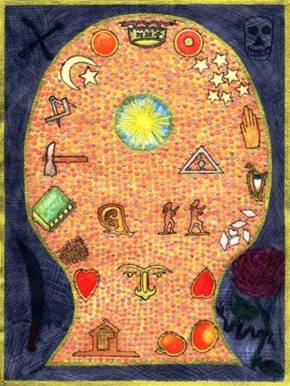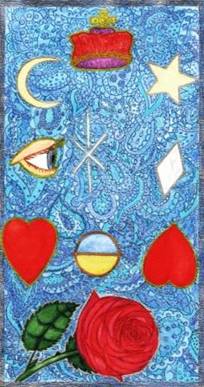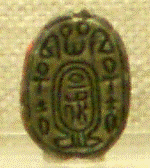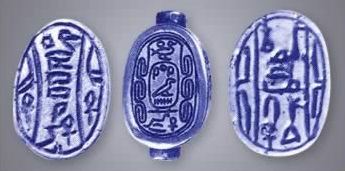Oahspe Study
THE EXODUS OF THE HEBREWS, MOSES AND PHARAOHS PART 8
The Exodus of the Hebrews IS the Expulsion of the Hyksos
Taking into account the conflicting accounts of how the so called Hyksos ruled in the delta regions, there still remains the mystery of their sudden disappearance and the question of who they really were. The Egyptian historical records that attribute the end of Hyksos rule as a result of a military campaign by Ahmose I must also be questioned.
For instance, we would ask whether the Expulsion was written with the intention of building up the New Pharaoh who had risen from the minor dynasty of the southern nome of Thebes. And at the same time, was the story intended to place Egyptian Hegemony into a victorious light rather than admit that Egypt had suffered humiliation and impoverishment with the exodus of its 4 million slaves (Arc of Bon, 27/15.26) --- A whole class of laborers who would no longer serve egyptian masters, no longer cultivate and harvest in the fields, no longer drudge at building vain-glorious pyramids and monuments? A significant proportion of Pharaoh's army had driven themselves into the sea and were drowned; and to seal to its humiliation, Egypt's own religion had been proven irrelevant and impotent against the religion of slaves who worshipped none but the Great Spirit!
||.....The historian Manetho writing much later during the Ptolemaic dynasty, considered the final expulsion of the Hyksos after nearly a century and the restoration of native Egyptian rule over the whole country a significant enough event to warrant the start of a new dynasty.||
The exodus of the Aamus (Asiatics) is also mentioned by Manetho:
||......reporting on the exodus of the Aamus from Egypt, Manetho wrote: "They went away with their whole family and effects, not fewer in number than two hundred and forty thousand, and took their journey from Egypt, through the wilderness for Syria... They built a city in that country which is now called Judea, and that large enough to contain a great number of men, and called it Jerusalem.The parallels with the biblical account of the Exodus is obvious.|| (retrieved 28 Sept, 07)
According to Oahspe, when Pharaoh Nu-ghan returned from chasing the Faithists (with the intent to slaughter them), having failed and with a good part of his army lost in the sea, he ordered the story of the migration be recorded and it was called: THE EXODUS OF THE HEBREWS. It can be no mere coincidence that Egyptian historical accounts refer to the Hyksos (Foreign Asiatics, Asiatic Chieftains), also, at the same time being EXPELLED from the Lower Lands of Egypt back east. But there is no archaeological evidence to suggest that there are any significant signs of a powerful domineering people (who had supposedly conquered Egypt) migrating east from Egypt at that time. Consequently, the two versions must be no more than different accounts of the same event, but the Hyksos expulsion was placed into a context that depicted the Pharaoh as a great military leader who had saved Egypt from foreign domination. It appears that the latter version is no more than the mythmaking of Egyptian Hegemony, having been "cleansed" of references to Hebrews, Moses and other "unworthy" individuals, and all humiliating events erased and rewritten.
The origins of the EXPULSION theme can be traced back to when Nu-ghan (Ahmose I) first succeeded the throne. Oahspe states that when Nu-ghan refused to allow the plans for the Migration to go ahead, Moses prophesied to Nu-ghan that he would indeed send his armies to drive out the Faithists, at which time Nu-ghan found this unbelievable.
Oahspe, Book of the Arc of Bon, 27/17.16, 17.
||.....And in His name I declare to you that you shall not only suffer my people to depart out of Egypt, but you shall send your armies to drive them out.
The king said: Moses, Moses, you are mad! For though all Egupt run blood, yet I will not do as you have said.||
But later, in rage over the death of his son due to the Passover (the first born of all of the Egyptians died on the night of the Passover with the Faithists leaving Egypt the following morning), Pharaoh pursued the Israelites intending to slaughter them all. This turn of events had the Israelites fleeing, driven by the pursuing armies till they appeared to be backed up against the Red Sea. With the armies driving them forward in fear for their lives, the Israelites escaped, leaving Egypt by way of the path across the bottom of the sea, as told in the Ezra bible and the Oahspe.
In the name of HYKSOS, we also find a connection to the Hebrews within the greater Asiatic tribes. Not only do Hy and He (as in Hebrew) begin with closely related syllables, they probably arise from the same root word. Hyksos is the Greek derivative of the ancient Egyptian term Hy-Kase, or Heka-Khasut for Asiatic-Chieftain or "foreign chieftain from the hill country (Canaan)". (Kurinsky 1994) Hy or Heka nominating the type and the khase nominating the rank of leadership.
Hy is also used as the paramount syllable in the name of Ancient tablets of the Faithists of Egypt. Tablets of the Faithists of Ancient Egypt are represented in Oahspe, Book of Saphah as shown below:
|
|
|
|
Tablet
of Ancient Egypt |
Tablet of Hy'yi
|
|
|
|
|
|
|
In their form can be seen the proto formation of the more modern Kabbala. Some surviving scarabs (amulets, seals) from the times of the Hyksos also have similar characteristics.
|
|
|
Scarabs (Seals) of the Hyksos
The two rows of three outside symbols with a band of inner symbols is typical of many scarabs found in the Delta regions. The oval with neck in the single scarab image surrounded an outer tableau of images is also seen in the Tablet of Ancient Egypt.
Hy is the first syllable that describes the tablet of Hy'yi, the proto Kabbala tablet in Oahspe, and is also the first syllable that describes the Foreign Chieftains in the word, Hy-Khase. It also may apply to the term Shepherd King, many of whom shared the same faith as the Israelites.
The Egyptian term Heka is associated with the personification of magic into the deity 'Heka'. The Egyptian concepts of spiritual potencies were understood in terms of magic and necromancy, and personifications of Gods and Goddesses as deities to be worshipped. The dialogue between Pharaoh and Moses which included references to miracles and Hored (a place of the deities and also referred to as the mountain Horeb in the Ezra bible), also provides clues about the common understanding they both had regarding consultation with the spirits. The Egyptians accepted the dominion of deities over the spirit world and consulted with oracles through priests and seers. The Israelites did not accept the dominion of lower heaven deities, refusing to worship or pay homage to Osiris or any deity, acknowledging only the unseen Creator. In the following dialogue between Pharaoh and Moses, Pharaoh is taken aback when he realizes that Moses is saying that he is speaking on behalf of the Creator, indicating a gap in Pharaoh's understanding of Who is Almighty.
Oahspe, Book of the Arc of Bon, 27/17.12 - 16.
|| The king said: You have no authority; you are a frozen serpent that was taken into the house of the king; and being thawed out, you turn to bite your benefactors. You are outlawed by men and accursed by the oracles. It is said of you, you have been to Hored, and there wed for sake of alliance with my high priest, Jethro, for conveyance of my lands to your people. Who are you, that pretends to hear a voice, and to be led by the Unseen? You slave!
Moses said: I am not here to plead my own cause, O king, but my people's. Suffice it, though, that even as your Lord God stands upon miracles, I do not bow down before him. For these are evidence that your God and your Lord are only angels of the dead, who labor for you and your aggrandizement, and not for all men's welfare.
For I have miracles also; and whatever your magicians can do, I can do also; do I not have eyes and ears, even as the oracles? Now I declare a miracle to you, which is that you yourself shall yet not only consent to my people going out of Egupt, but you shall send armies to drive them out. To turn a rod into a serpent, or water into wine; or to show the spirits of the dead, alas, O king, even those who are of rotten flesh can do such things!
Pharaoh said: If the oracle hears God, is this not the greatest? Moses replied: He who utters what an angel bid him is that angel's servant; he who utters a good truth has spoken with Jehovih's voice. Pharaoh asked: Do you say your words are the Creator's?
Moses replied: I am like all good men who speak truth; all that is good, and all truth, are Jehovih's words. In a rose He finds expression in perfume; in the lightning His words are thunder; in a bird His words are songs; but in man, His voice is in man's words; for every living creature, and every dead thing on the earth, or in the waters, or in the air above the earth, gives expression in its own way; because the Father's hand is the foundation of all that is good and true. He is the I Am Who sent me to you; by His command I open my mouth before you. And in His name I declare to you that you shall not only allow my people to depart out of Egupt, but you shall send your armies to drive them out. ||
So it seems, by the prefix Hy and also He as in Hebrews, it may well have been the religion of the Israelites that was the identifying term distinguishing them from the worshippers of Osiris, the Egyptians.
All Oahspe references are from the Standard Edition Oahspe of 2007
● GO TO NEXT ARTICLE:
Part 9 - Who were Moses and the Pharaohs



